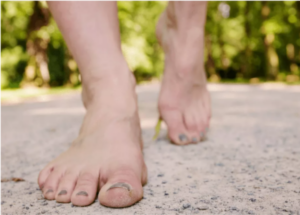Taking care of sensitive skin requires a thoughtful approach, especially when it comes to areas like the feet that may not always receive the same attention as the face or hands. One common tool for maintaining smooth feet is the pumice stone, a natural volcanic rock known for its abrasive properties. However, for those with sensitive skin, the question arises: Can sensitive skin benefit from a pumice stone foot scrubber? To answer this, it’s essential to explore various facets of the subject.
First, understanding what constitutes sensitive skin is crucial, as it reacts differently compared to normal skin types, often requiring special care to avoid irritation. Next, the properties of pumice stones must be examined to determine why they are commonly used in foot care. This leads to the broader benefits of foot exfoliation, which helps in removing dead skin cells and keeping the feet soft and healthy. However, the risks associated with using pumice stones, particularly on sensitive skin, cannot be overlooked. These risks prompt the exploration of alternative foot care methods that might be more suitable for those with sensitive skin, ensuring effective care without discomfort or damage. This comprehensive approach will help individuals with sensitive skin make informed decisions about using pumice stones and maintaining healthy feet.
Definition of Sensitive Skin
Sensitive skin is a term used to describe skin that is more reactive than normal skin to external factors such as environmental changes, skincare products, and physical irritants. People with sensitive skin often experience discomfort, such as itching, burning, dryness, and redness more easily than others. This type of skin condition requires special care because it can be easily damaged by regular skincare products and treatments that are typically tolerable to non-sensitive skin types.
The characteristics of sensitive skin can vary widely from one person to another. It often lacks a strong barrier function, which means that it has a reduced ability to protect itself against irritants. This can lead to a higher risk of skin disorders such as eczema or rosacea. These conditions can exacerbate the sensitivity, creating a cycle that requires careful management and gentle skincare approaches.
Understanding the specific needs and triggers of sensitive skin is crucial for effective care. Typically, products used for sensitive skin are free from potential irritants like fragrances, alcohol, and harsh chemicals. Instead, they often contain soothing and hypoallergenic ingredients designed to calm the skin and strengthen its barrier. Proper identification and management are key in maintaining the health and comfort of sensitive skin.
Properties of Pumice Stones
Pumice stones are small, porous rocks formed during volcanic eruptions when super-heated, highly pressurized rock is violently ejected from a volcano. This type of rock is characterized by a frothy appearance and a lightweight nature, which is primarily due to the rapid cooling and depressurization that traps bubbles of gas to form a highly vesicular texture. These unique properties make pumice stones very abrasive, yet light enough to float on water.
In the context of skincare, particularly foot care, pumice stones are commonly used to remove dead skin cells and calluses, contributing to smoother and softer skin surfaces. The abrasive surface of a pumice stone makes it an excellent tool for exfoliating tough skin, especially on the feet where skin tends to become thick and hardened. When used properly, pumice stones can effectively scrape away the outermost layer of dead skin, revealing the softer, more supple skin beneath.
However, while pumice stones are beneficial for exfoliation, their rough texture requires careful handling, especially for those with sensitive skin. The intensity of exfoliation depends greatly on the pressure applied during use and the area of skin being treated. For sensitive skin types, excessive or overly vigorous use of pumice stones can lead to skin irritation, abrasions, or even wounds. Therefore, it is crucial for individuals with sensitive skin to approach the use of pumice stones with caution, potentially seeking gentler alternatives or consulting with a dermatologist to avoid adverse effects.
Benefits of Foot Exfoliation
Foot exfoliation, especially when done using a pumice stone, can offer numerous benefits. For many, the primary advantage is the removal of dead skin cells from the feet, which can help prevent the buildup of calluses and corns, keeping the skin smooth and soft. This process can also improve the appearance of your feet, making them look more well-groomed and healthy.
Moreover, exfoliation can enhance the circulation of blood in the feet. The gentle scrubbing action on the skin stimulates blood flow, which can aid in the healing of cracked heels and other minor foot ailments. Improved circulation not only helps in faster healing but also promotes better overall foot health.
Regular foot exfoliation might also contribute to more effective sweating of the feet, which is essential for the natural regulation of body temperature. Additionally, it can increase the efficacy of moisturizers. By removing the outermost layer of dead skin cells, moisturizers can penetrate deeper into the skin, providing better hydration and preventing dryness and cracks.
Despite these benefits, it is crucial for individuals with sensitive skin to approach foot exfoliation with caution, especially when using a pumice stone. It’s important to ensure that the exfoliation is gentle to avoid skin irritation or damage.
Risks of Using Pumice Stones on Sensitive Skin
Sensitive skin is particularly vulnerable and demands gentle care, especially when it comes to exfoliation. Using a pumice stone, which is a light, porous volcanic rock commonly used to remove dead skin cells from feet, might not always be the best choice for those with sensitive skin. The abrasive nature of the pumice stone can lead to micro-tears in the skin if not used correctly, which might cause irritation or exacerbate existing skin issues.
For individuals with sensitive skin, the risk of inflammation and skin damage is heightened when using a pumice stone. This is because sensitive skin typically has a weaker barrier function and is more prone to redness, itching, and irritation. When a rough material like pumice is rubbed against delicate skin, it can strip away too much of the natural oils, leaving the skin dry and unprotected.
It is crucial for individuals with sensitive skin to approach the use of a pumice stone with caution. Techniques such as gentle circular motions and using the stone infrequently can help minimize potential damage. Moreover, it is advised to always moisturize the skin after using a pumice stone to help restore hydration and protect the skin barrier. Ultimately, consulting with a dermatologist or skincare professional can provide personalized advice and safe alternatives for maintaining healthy, smooth feet without compromising skin health.
Alternative Foot Care Methods for Sensitive Skin
For individuals with sensitive skin, finding suitable foot care methods that do not irritate or damage the skin is crucial. Using a pumice stone may not always be the best option due to its abrasive nature, which can lead to redness, irritation, or even wounds. Therefore, exploring gentler alternatives is essential for maintaining healthy skin.
One effective alternative is the use of foot scrubs that are specifically formulated for sensitive skin. These scrubs tend to have finer, softer granules as opposed to the coarse texture of a pumice stone. Ingredients such as oatmeal, fine sugar, or soft beads can provide a gentle exfoliation, removing dead skin cells without causing undue stress to the skin.
Another method involves the use of chemical exfoliants, like those containing alpha hydroxy acids (AHAs) or beta hydroxy acids (BHAs). These chemicals gently dissolve the bonds between dead skin cells, allowing them to be washed away without the need for physical scrubbing. Products containing lactic acid, glycolic acid, or salicylic acid can be beneficial, but it is important to choose formulations that are low in concentration and designed for sensitive skin to avoid irritation.
Soaking the feet in warm water with added moisturizing agents like Epsom salts or essential oils can also be beneficial. This process can help to soften the skin and nails, making it easier to exfoliate gently using a soft cloth or a very soft brush. After soaking, it is important to moisturize the feet thoroughly to keep the skin hydrated and prevent cracking.
By choosing the right products and methods, individuals with sensitive skin can effectively care for their feet without risking irritation or damage. Regular, gentle care is key to maintaining smooth, healthy feet while avoiding the potential pitfalls of more abrasive methods.




